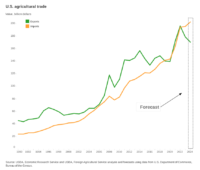Bloomberg's Clarice Couto reported this past Friday that "a surprising tax change in agriculture powerhouse Brazil has the potential to make soy grown in the world’s largest bean exporter less…
Federal Assistance for Farm Trade Impacts
On Monday, President Trump noted that ongoing trade turbulence with China could adversely impact U.S. agricultural producers already hampered by a sluggish U.S. farm economy. The President has asked the U.S. Department of Agriculture for options to assist farmers negatively impacted by the recent trade developments. Meanwhile, Secretary of Agriculture Sonny Perdue faced questions from farm state lawmakers about trade issues, and potential responses, at a Senate hearing on Wednesday morning.
President Trump- China Trade Dispute Impacting U.S. Farmers
DTN Ag Policy Editor Chris Clayton reported earlier this week that, “Calling farmers ‘great patriots,’ President Donald Trump acknowledged Monday that American farmers could suffer in the trade dispute with China. But the president said farmers would end up doing better than they are now once the trade barbs have ended.
“Speaking before a Cabinet meeting at the White House, Trump lashed out at previous administrations, blaming them for forcing his White House to renegotiate the North American Free Trade Agreement and go head-to-head with China over theft of international property. Trump also criticized China for choosing to impose tariffs on U.S. farm products.
‘They want to hit the farmers because they think it hits me; I wouldn’t say that’s nice, but I’ll tell you our farmers are great patriots,’ Trump said. ‘These are great patriots and they understand that they’re doing this for the country. And we’ll make it up to them, and in the end they’re going to be much stronger than they are now.’
On Monday, Wall Street Journal writer Michael C. Bender reported that, “The president has asked the Agriculture Department for a list of options to mitigate China’s ‘attack’ on farmers, White House press secretary Sarah Huckabee Sanders said later on Monday.
“The president will ‘present a plan on specifics of that shortly,’ Ms. Sanders said.”
“Mr. Trump noted that on Monday that the nation’s farm economy had already ‘significantly’ declined: ‘Farmers have been trending downward over an eight-year period.'”
Mr. Bender added, “Mr. Trump said he would ‘probably’ find a way to negotiate with China over trade. If not, he said, ‘they’ll have to pay pretty high taxes to do business in our country.'”
USDA Plan- Lawmaker Perspective, Secretary Perdue Remarks
Earlier this week, Bloomberg writer Alan Bjerga reported that, “Leading lawmakers on congressional agriculture committees said Tuesday they’re skeptical that the White House can fix any economic harm for farmers arising from a trade dispute with China by giving them temporary aid through the Agriculture Department.
“‘We don’t need another subsidy program, we need to sell our product,’ Republican Senator Pat Roberts of Kansas, chairman of the Senate Agriculture Committee, said at a meeting of agricultural reporters in Washington. ‘If we do that, we don’t need some sort of crazy-quilt program.'”
The Bloomberg article stated that, “[House Ag Committee Ranking Member Collin Peterson (D., Minn.) proposed using a farm bill, due for reauthorization by Sept. 30, as a way to deal with trade disruptions.
“He said farmers currently enrolled in subsidies based on overall revenue should be allowed to switch into programs sensitive to falling prices, the likely outcome of any trade war. Peterson also called for a 10 percent increase in the so-called target price for crops such as corn, soybeans and cotton.”
“Roberts later dismissed Peterson’s idea, saying ‘there’s no new money‘ to boost farm payments,” the article said.
Beijing’s tariffs threaten 65% cut in US #soyabean sales to #China https://t.co/r2SOcDgtOC by @EmikoTerazono pic.twitter.com/9C7RAE79me
— Farm Policy (@FarmPolicy) April 11, 2018
Wall Street Journal writer Bob Davis, Siobhan Hughes and Jesse Newman reported on Wednesday that, “The Trump administration is seeking to blunt domestic opposition to its trade policies with a relief package for farmers affected by the U.S. trade spat with China, say officials involved in the discussions.
“The aid package, which could climb into the billions of dollars, is still being developed. Agriculture and congressional officials are examining Depression-era programs like the Commodity Credit Corp., which was created in 1933 to stabilize farm incomes, and which permits borrowing of as much as $30 billion from the Treasury to finance its activities. Using the CCC would also give the administration an existing program to tap, rather than having to devise something new that would need to clear Congress.
“These programs haven’t traditionally been used in trade fights, but Congress has started to clear the way for the CCC to be tapped.”
The Journal writers explained, “Last month, lawmakers lifted restrictions that, until now, stood in the way of the Agriculture Department using a special price-support program to aid farmers. The change, tucked into a sweeping, $1.3 trillion spending bill, reversed years of restrictions that had prevented the CCC from supporting farm prices or buying surplus products.
“Sen. Chuck Grassley (R., Iowa) said that the Trump administration could rely on the CCC and related authorities to shield farmers from the effects of any tariffs imposed by China.
‘I’ve had a conversations with people in the administration that thought if there were ever tariffs imposed, that the income coming from the tariffs could be used for that purpose,’ Mr. Grassley said on Tuesday.
The Journal writers also pointed out, “The cost of any compensation program could quickly mount. China is by far the largest foreign buyer of U.S. soybeans, making up nearly 60% of international sales, according to the Agriculture Department…Compensating farmers for a 10% reduction in the price of soybeans and hogs could cost $5 billion, according to industry calculations.”
On Wednesday morning, Secretary of Agriculture Sonny Perdue appeared before the Senate Appropriations Agriculture Subcommittee hearing to review the FY2019 USDA budget request.
At the hearing, Tammy Baldwin (D., Wis.) indicated that, “The recently passed omnibus legislation provided your department with additional resources to address the impacts of retaliatory tariffs on agricultural products…so I’m interested in knowing what specific steps you’re going to take to help farmers who may be impacted by retaliation by China, and will you use the authorities provided in the recently enacted fiscal year 2018 agriculture appropriations bill?”
Secretary Perdue noted, “Obviously our first goal is to negotiate ourselves out of the saber rattling that’s occurred and to make sure that these market disruptions don’t have a permanent impact.”
AUDIO CLIP: @SecretarySonny at today's Senate Appropriations Ag Subcommittee hearing-- discusses #trade, low commodity prices, farm income- https://t.co/0fkmRek5YC (MP3- 2:30 minutes) pic.twitter.com/0aPqK2VsrP
— Farm Policy (@FarmPolicy) April 11, 2018
Sec. Perdue added, “So our goal, obviously, is to finish NAFTA, which is important to your state as well, and then to work on negotiations with China so we don’t have to get into mitigation efforts. But thankfully to you all in the 2018 omnibus, you all gave us the liberty to use some of those tools at the disposal to make sure that our farmers don’t bear the brunt of retaliation.”
After being pressed further for more details by Sen. Baldwin, Sec. Perdue indicated that, “What we have done so far is on a weekly basis look at the market impact. I’ve talked with our economist. Dr. Johansson may be able to describe more deftly what the calculations of determining the market trade impact or the trade dispute impacts are versus normal or seasonal market disruptions.
“What we don’t want to do is to create an environment where we take normal trade fluctuations there and attribute them to trade disruptions in a retaliatory kind of way. Our economists tell us that we have very good tools, they feel very precise tools, to identify that.”

Also, in response to a question from Sen. Roy Blunt (R., Mo.) Secretary Perdue stated,
The President has assured me, and I’ve tried to assure the constituency, our constituency out there, that we’re not going to ask farmers to bear the brunt and to be the casualties in a trade dispute war.
“And how we do that, and obviously our goal is to have negotiations. I was very pleased over the weekend to see the Chinese president come back and indicate some willingness to sit down and talk.”
More broadly, in responding to a question from Sen Jon Tester (D., Mont.) Sec. Perdue noted that, “Let’s talk about where we are on the trade negotiations again. We were, I think we had a successful negotiation with KORUS, and that will be announced very soon. Agriculture is better off, no worse off than we were with KORUS. We are expecting, Senator, an agreement on NAFTA that has some improvements for agriculture. Maybe not all that we wanted, but some improvements with agriculture on NAFTA.
“I know that you and I probably wouldn’t use the same negotiating style that President Trump does, but it appears that even with China calling the question on some of these things—look, there’s no doubt I’m anxious. Producers are anxious. It’s their livelihood. It’s their future. But we do expect that we can get negotiations here done on those. I think that will relieve the anxiety meter to a degree, and then deal with the China issue.”







